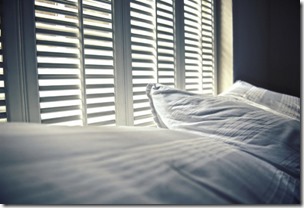The Bedroom
Returning to an unmade bed
during the sixth hour
there seemed to me
a shifting calm
flowing through those places
where our bodies met.
Between thin shadows
cast by white shutters
echoes of bells and
familiar sounds
like merging rivers.
16 April 1986
 This is an odd poem in many ways. It has always felt a little out of place in my canon as if I was writing in someone else’s voice. It has a calm, paced tone, deliberately and appropriately so. It is also not remotely autobiographical and somehow rises above the misery that undercuts so much of my poetry at this time. I know I worked on it for a long time—I kept changing the third line from “there seemed to me” to “there seemed to be” and back again—and if ever a poem of mine was, in the well-known words of Paul Valery, “abandoned” it was this one. Every time I read it I want to do something with it, fix it and yet I think that is the quality that works here; there is something not quite right here, something uncomfortable.
This is an odd poem in many ways. It has always felt a little out of place in my canon as if I was writing in someone else’s voice. It has a calm, paced tone, deliberately and appropriately so. It is also not remotely autobiographical and somehow rises above the misery that undercuts so much of my poetry at this time. I know I worked on it for a long time—I kept changing the third line from “there seemed to me” to “there seemed to be” and back again—and if ever a poem of mine was, in the well-known words of Paul Valery, “abandoned” it was this one. Every time I read it I want to do something with it, fix it and yet I think that is the quality that works here; there is something not quite right here, something uncomfortable.
What is happening in the poem? Not much. Someone, a man or a woman, has gone back to bed for a siesta. The word comes from the Latin word sexta which means "the sixth hour". Siestas are not a part of British life and neither are window shutters except for decoration. Had I known the word at the time I might’ve tried to incorporate volets into the poem and probably never got the damn thing finished. Suffice to say the setting (for me) has always been the Continent, somewhere I’ve never been. It’s never mattered to me whether the person going back to bed is male or female and at this point in my life I never went back to bed. Now I do. Now I could happily sleep the rest of my life away. But in my mid-twenties I had all the energy in the world.
The poem’s narrator has gone back to a bed where some time before he or she has not been alone. Are they trying to relive the moment? Perhaps. Oddly enough smells are not mentioned. Only sounds or not exactly sounds, echoes of sounds. Can you hear an echo without first hearing the sound that caused it? Are these true echoes or a memory of bells? And what of the “familiar sounds”? Are they sounds or also echoes of sounds? You could read it that way. I think of the poem as an attempt to capture one of those moments when the past and the present collide. It’s a poem where every word was sweated over. But it’s not right and it will never be right. Like the bed in the poem it’s a bit of a mess but every now and then I crawl back into it and try to remember.
The bells come, I think, from Betjeman. He’s not a poet I have any great love for but he does write a lot about bells: “Into nine–o’clock Camberly, heavy with bells”, “The bells of waiting Advent ring”, “Bask beneath the Abbey bells”, “Bells are booming down the bohreens”, “The Easter bells enlarge the sky”, “A single bell with plaintive strokes”. I’ve tried to find the poem that I read at the time—I’m positive there was one because I recall a sense of guilt at pinching two or three words from it—but Google has failed me. Of course it could be Larkin:
Between long houses, under travelling skies,
Heard in contending bells —
An air lambent with adult enterprise,
And on another day will be the past,
(from ‘Triple Time’)
but now I’m stretching. Over time, and much to my surprise, I wrote another three bedroom poems. You can read the whole sequence here.